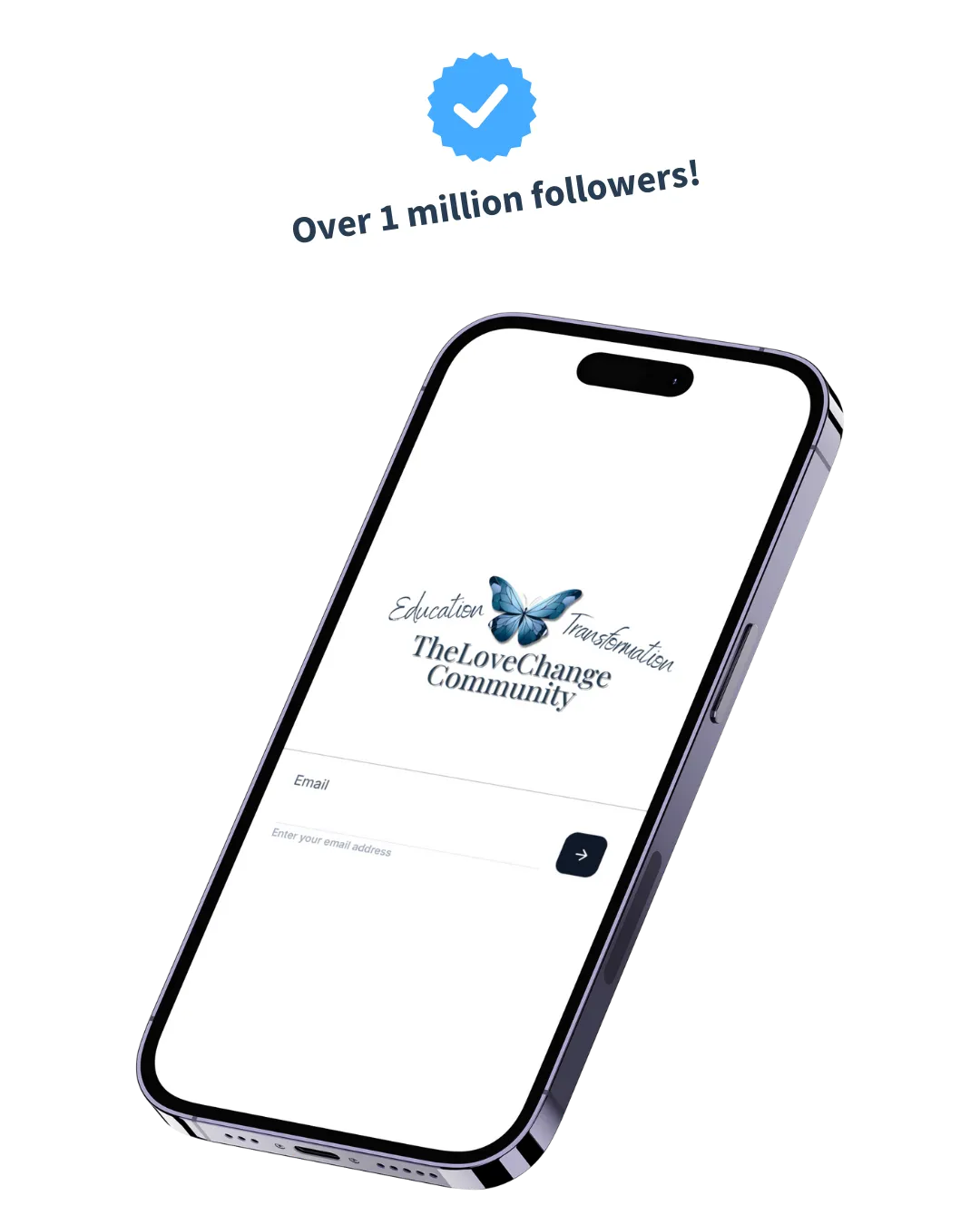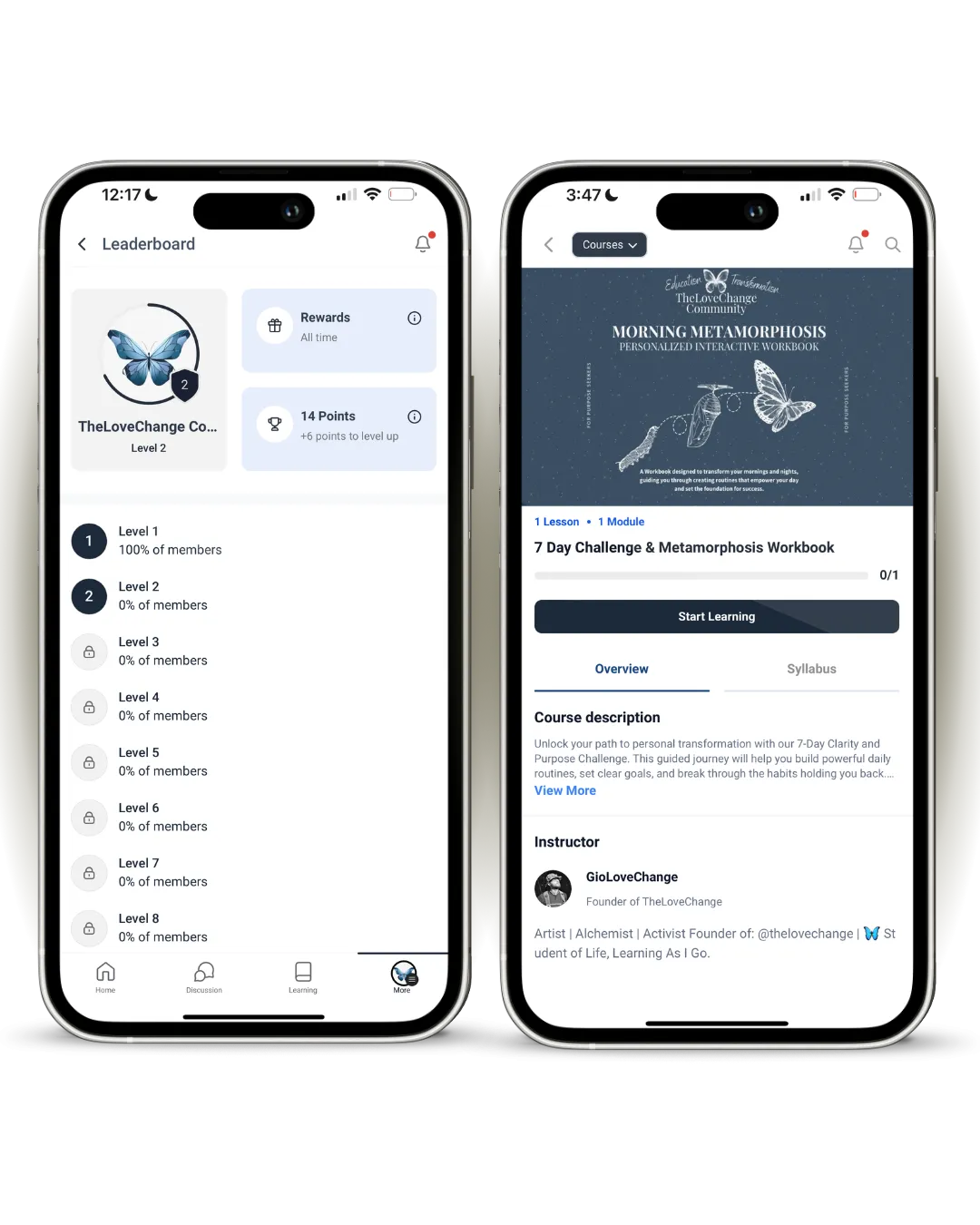Unlock Your True Potential With TheLoveChange
Download our FREE App for a curated journey tailored to your soul’s
deepest desires and life’s ambitions.




What Is TheLoveChange Community ?
Simplifying Your Journey To Fulfillment.

Expert-Led Live Sessions
Learn from the best in the field. Founder of TheLoveChange, GioLoveChange and special guest coaches are here to guide you every step of the way.

Personalized Growth Path
Dive deep with tailored content, courses, and coaching sessions that align with where you are and where you want to go.

Exclusive Content & Resources
Gain access to a library of workshops, masterclasses, and content not available elsewhere.

Community of Like-Minded Individuals
Connect, collaborate, and grow with fellow members on similar life journeys. Share stories, gain insights, and build relationships.
Metamorphic Society
Join The 1%
Discover your purpose, nurture your creativity, and master timeless skills.
Metamorphic Society
Join 100+ members improving themselves, their purpose, and their lifestyle.
Gain instant access to our exclusive live workshops on: productivity, mindfulness, emotional well-being, relationships, purpose discovery, career fulfillment.
(Not to mention the monthly challenges, community support, live trainings, workshops, and everything else you need to eliminate buying courses from your life.)




5 Secret Ways to Meditate Properly for Enhanced Mental Clarity

5 Secret Ways to Meditate Properly for Enhanced Mental Clarity
Meditation is often shrouded in mystery and misconceptions, leaving many to believe it's a practice reserved for monks and mystics. However, meditation is a deeply personal experience, accessible to anyone willing to explore its depths. In this blog post, we will explore five secret ways to meditate properly, helping you to unlock the full potential of your meditation practice for improved mental clarity and emotional health.
Despite its growing popularity, many still struggle with meditation, discouraged by their wandering thoughts or discomfort. However, by understanding and applying these five techniques, you can transcend common barriers and experience the profound benefits meditation has to offer.
1. Embrace All Thoughts and Emotions
Stop Blocking and Start Observing
Many beginners mistakenly try to block out thoughts and emotions during meditation, which can actually lead to increased stress and resistance. Instead, meditation should be about observing these thoughts and feelings without judgment. Embracing whatever arises in your mind helps reduce the power of these thoughts and emotions over time, leading to a calmer, more centered state of being.
2. Slow Down and Focus on One Sense
Tune Into Your Sensory Experience
In our fast-paced, multitasking world, slowing down is a powerful act. One effective way to do this is by focusing on just one of your senses during meditation. Whether it’s the feel of your breath entering and leaving your nostrils, the sound of birds chirping outside your window, or the sight of a candle flame, tuning into one sense can help calm your mind and enhance your concentration.
3. Be Aware of Your Breathing
Practice Mindful Breathing to Anchor Your Mind
Breath awareness is a cornerstone of many meditation practices. Simple techniques like the "4-7-8" breathing method, where you inhale for four seconds, hold your breath for seven seconds, and exhale for eight seconds, can significantly enhance your ability to stay present. This practice not only helps stabilize your mind but also connects you deeper with the life force within you.
4. Learn the Art of Surrender
Finding Power in Vulnerability
Meditation involves surrendering control—a challenge for those used to steering the ship at all times. By allowing yourself to be vulnerable and letting go of past and future worries during meditation, you can fully engage with the present moment. This surrender leads to profound insights and emotional release, further deepening your meditation experience.
5. Stop Labeling Thoughts
Thoughts are Neutral by Nature
A common obstacle in meditation is the habit of labeling thoughts as good or bad. This judgment can create resistance and detract from the meditative experience. Instead, view thoughts as neutral events in the mind. By doing so, you can reduce their impact, allowing a more peaceful state of mind to prevail.
Conclusion
Meditating properly doesn’t require hours of silent contemplation each day; rather, it demands understanding and applying these five principles effectively. As you incorporate these techniques into your practice, you'll likely notice a shift towards greater mental clarity and emotional resilience.
Remember, the journey of meditation is as important as the destination. Be patient with yourself, and allow your practice to evolve at its own pace. Embracing these techniques will not only enhance your meditation but can improve your overall quality of life.
Frequently Asked Questions
Q1: How long should I meditate each day? A: Start with a comfortable duration, even if it's just 5 minutes, and gradually increase as you feel able.
Q2: What is the best time of day to meditate? A: While early morning or late evening works for many, the best time is one that fits consistently into your schedule.
Q3: Can meditation help with anxiety? A: Yes, regular meditation can significantly reduce symptoms of anxiety and help manage stress.
- GioLoveChange (Founder of TheLoveChange)

5 Secret Ways to Meditate Properly for Enhanced Mental Clarity

5 Secret Ways to Meditate Properly for Enhanced Mental Clarity
Meditation is often shrouded in mystery and misconceptions, leaving many to believe it's a practice reserved for monks and mystics. However, meditation is a deeply personal experience, accessible to anyone willing to explore its depths. In this blog post, we will explore five secret ways to meditate properly, helping you to unlock the full potential of your meditation practice for improved mental clarity and emotional health.
Despite its growing popularity, many still struggle with meditation, discouraged by their wandering thoughts or discomfort. However, by understanding and applying these five techniques, you can transcend common barriers and experience the profound benefits meditation has to offer.
1. Embrace All Thoughts and Emotions
Stop Blocking and Start Observing
Many beginners mistakenly try to block out thoughts and emotions during meditation, which can actually lead to increased stress and resistance. Instead, meditation should be about observing these thoughts and feelings without judgment. Embracing whatever arises in your mind helps reduce the power of these thoughts and emotions over time, leading to a calmer, more centered state of being.
2. Slow Down and Focus on One Sense
Tune Into Your Sensory Experience
In our fast-paced, multitasking world, slowing down is a powerful act. One effective way to do this is by focusing on just one of your senses during meditation. Whether it’s the feel of your breath entering and leaving your nostrils, the sound of birds chirping outside your window, or the sight of a candle flame, tuning into one sense can help calm your mind and enhance your concentration.
3. Be Aware of Your Breathing
Practice Mindful Breathing to Anchor Your Mind
Breath awareness is a cornerstone of many meditation practices. Simple techniques like the "4-7-8" breathing method, where you inhale for four seconds, hold your breath for seven seconds, and exhale for eight seconds, can significantly enhance your ability to stay present. This practice not only helps stabilize your mind but also connects you deeper with the life force within you.
4. Learn the Art of Surrender
Finding Power in Vulnerability
Meditation involves surrendering control—a challenge for those used to steering the ship at all times. By allowing yourself to be vulnerable and letting go of past and future worries during meditation, you can fully engage with the present moment. This surrender leads to profound insights and emotional release, further deepening your meditation experience.
5. Stop Labeling Thoughts
Thoughts are Neutral by Nature
A common obstacle in meditation is the habit of labeling thoughts as good or bad. This judgment can create resistance and detract from the meditative experience. Instead, view thoughts as neutral events in the mind. By doing so, you can reduce their impact, allowing a more peaceful state of mind to prevail.
Conclusion
Meditating properly doesn’t require hours of silent contemplation each day; rather, it demands understanding and applying these five principles effectively. As you incorporate these techniques into your practice, you'll likely notice a shift towards greater mental clarity and emotional resilience.
Remember, the journey of meditation is as important as the destination. Be patient with yourself, and allow your practice to evolve at its own pace. Embracing these techniques will not only enhance your meditation but can improve your overall quality of life.
Frequently Asked Questions
Q1: How long should I meditate each day? A: Start with a comfortable duration, even if it's just 5 minutes, and gradually increase as you feel able.
Q2: What is the best time of day to meditate? A: While early morning or late evening works for many, the best time is one that fits consistently into your schedule.
Q3: Can meditation help with anxiety? A: Yes, regular meditation can significantly reduce symptoms of anxiety and help manage stress.
- GioLoveChange (Founder of TheLoveChange)
Gain A New Perspective On Life & Purpose
Join 10,000+ subscribers elevating their minds reading TheLoveChange Letter every Saturday morning (you may learn a bit about life too).
*We respect your privacy and promise to only send insightful value your way.
© 2025 TheLoveChange - All Rights Reserved
About - Contact Us - Letters


